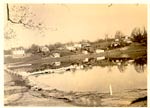
The Ole Swimmin' Hole
 |
Click on any picture to see a full-sized photo, or click here to view the Photo Gallery of Sparkle Lake. Several text links throughout this feature also display photos related to the story. |
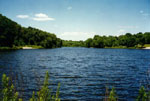 The
history of Sparkle Lake parallels the growth of Yorktown from an agricultural
community, through its days as a vacation destination, to today's suburban
center. Sparkle Lake, with the only sandy beach in town, continues to give
Yorktowners a spot to relax and cool off on a hot summer day, to ice-skate
during the winter months and to enjoy the natural beauty of our town during all
seasons. From fishing competitions, to hockey games, to building sand castles,
Sparkle Lake provides a unique resource for the town.
The
history of Sparkle Lake parallels the growth of Yorktown from an agricultural
community, through its days as a vacation destination, to today's suburban
center. Sparkle Lake, with the only sandy beach in town, continues to give
Yorktowners a spot to relax and cool off on a hot summer day, to ice-skate
during the winter months and to enjoy the natural beauty of our town during all
seasons. From fishing competitions, to hockey games, to building sand castles,
Sparkle Lake provides a unique resource for the town.
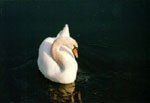 The
Town of Yorktown keeps the "sparkle" in the lake's habitat-friendly
water. Controlling algae and aquatic weeds (with the help of specially-bred
carp), saving swans from fishing tackle and removing oversized turtles are only
some of the duties performed by the Parks and Recreation Department in addition
to providing a safe swimming and skating environment for residents.
The
Town of Yorktown keeps the "sparkle" in the lake's habitat-friendly
water. Controlling algae and aquatic weeds (with the help of specially-bred
carp), saving swans from fishing tackle and removing oversized turtles are only
some of the duties performed by the Parks and Recreation Department in addition
to providing a safe swimming and skating environment for residents.
 The
one-half mile long, 19-acre lake was once just a good old-fashioned swimming
hole created by Major Hyatt to provide water for his cattle. His 162-acre farm
was maintained by the Hyatt family from 1861 until 1926 (click here
for Hyatt family genealogy) when it was purchased by
Frederick Merk. The original farmhouse still stands on the corner of Granite
Springs Road and Broad Street.
The
one-half mile long, 19-acre lake was once just a good old-fashioned swimming
hole created by Major Hyatt to provide water for his cattle. His 162-acre farm
was maintained by the Hyatt family from 1861 until 1926 (click here
for Hyatt family genealogy) when it was purchased by
Frederick Merk. The original farmhouse still stands on the corner of Granite
Springs Road and Broad Street.
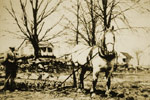 Mr.
Merk moved his family from New York City to the farm in April of 1926. He
expanded the lake and established a campground community on the hills
surrounding the lake along Hyatt Lane (later Hyatt Boulevard and Hyatt Street)
and West Somers Road (now Granite Springs Road). Later, he developed the land
for more permanent housing on what came to be known as “Merk Farm”.
Mr.
Merk moved his family from New York City to the farm in April of 1926. He
expanded the lake and established a campground community on the hills
surrounding the lake along Hyatt Lane (later Hyatt Boulevard and Hyatt Street)
and West Somers Road (now Granite Springs Road). Later, he developed the land
for more permanent housing on what came to be known as “Merk Farm”.
 The
homes on the west side of the lake were deeded permanent lake rights and an
association was formed. The members of the association picnicked and partied
together and formed a tight-knit social group for most of the 1930’s through
the 1950’s (for photos click here
and select the photos under Homeowners'
Association)
The
homes on the west side of the lake were deeded permanent lake rights and an
association was formed. The members of the association picnicked and partied
together and formed a tight-knit social group for most of the 1930’s through
the 1950’s (for photos click here
and select the photos under Homeowners'
Association)
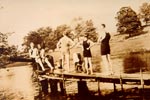 As
early as 1929, Fred Merk had built a public bathing area on the east side of the
lake, using the former Hyatt Farm barns for a snack bar and dressing
rooms. He
built a long dock, diving pier and floating dock which were replaced several
times by the early 1960’s. He even provided a tram in the 1950’s to
transport people from the picnic grounds to the lake, making it an ideal spot
for out-of-town groups, such as churches, to hold their special events. The Merk
family provided everything, including lifeguards to watch over the
bathers.
As
early as 1929, Fred Merk had built a public bathing area on the east side of the
lake, using the former Hyatt Farm barns for a snack bar and dressing
rooms. He
built a long dock, diving pier and floating dock which were replaced several
times by the early 1960’s. He even provided a tram in the 1950’s to
transport people from the picnic grounds to the lake, making it an ideal spot
for out-of-town groups, such as churches, to hold their special events. The Merk
family provided everything, including lifeguards to watch over the
bathers.
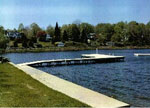 The
Merk family offered to sell Sparkle Lake to the Town in 1961 when it became too
difficult for them to maintain. The Town refused the offer, so in 1964 they sold
it to a Mr. Feldman who leased it to the Town for the next two summers. On April
18, 1966 the Town of Yorktown purchased the lake and 14 adjacent acres for
$59,000. Much discussion preceded the sale, mostly related to the deeded lake
rights on the west side held by members of the Sparkle Lake Homeowners
Association. Ultimately, the Town recognized the Association members’ rights.
The
Merk family offered to sell Sparkle Lake to the Town in 1961 when it became too
difficult for them to maintain. The Town refused the offer, so in 1964 they sold
it to a Mr. Feldman who leased it to the Town for the next two summers. On April
18, 1966 the Town of Yorktown purchased the lake and 14 adjacent acres for
$59,000. Much discussion preceded the sale, mostly related to the deeded lake
rights on the west side held by members of the Sparkle Lake Homeowners
Association. Ultimately, the Town recognized the Association members’ rights.
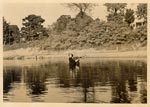 Over
the years, Sparkle Lake has provided the residents of Yorktown with excellent
four-season recreation, as well as some unusual events as Immersion Baptisms and
Town Board meetings. With the help of the residents in keeping the area clean
and a dedicated Parks and Recreation staff to handle the tough daily
environmental job, the man-made “ol’ swimmin’ hole” should be a popular
place to visit for many years to come.
Over
the years, Sparkle Lake has provided the residents of Yorktown with excellent
four-season recreation, as well as some unusual events as Immersion Baptisms and
Town Board meetings. With the help of the residents in keeping the area clean
and a dedicated Parks and Recreation staff to handle the tough daily
environmental job, the man-made “ol’ swimmin’ hole” should be a popular
place to visit for many years to come.
For more information on Sparkle Lake, go to www.sparklelake.org/.
P.S. The original “swimming hole” can be seen when Sparkle Lake is drained periodically to control aquatic weeds without use of chemicals or mechanical harvesting.
Written
by Linda L. Kiederer
Photos courtesy of the Town Clerk’s Office and the Sparkle Lake Association.
Continuation in a series of predictions about the 20th Century from The Ladies Home Journal of December 1900 (click HERE for the complete list of predictions):
Prediction #11: No Mosquitoes nor Flies. Insect screens will be unnecessary. Mosquitoes, house-flies and roaches will have been practically exterminated. Boards of health will have destroyed all mosquito haunts and breeding-grounds, drained all stagnant pools, filled in all swamp-lands, and chemically treated all still-water streams. The extermination of the horse and its stable will reduce the house-fly.
Prediction #12: Peas as Large as Beets. Peas and beans will be as large as beets are to-day. Sugar cane will produce twice as much sugar as the sugar beet now does. Cane will once more be the chief source of our sugar supply. The milkweed will have been developed into a rubber plant. Cheap native rubber will be harvested by machinery all over this country. Plants will be made proof against disease microbes just as readily as man is to-day against smallpox. The soil will be kept enriched by plants which take their nutrition from the air and give fertility to the earth.
Prediction #13: Strawberries as Large as Apples will be eaten by our great-great-grandchildren for their Christmas dinners a hundred years hence. Raspberries and blackberries will be as large. One will suffice for the fruit course of each person. Strawberries and cranberries will be grown upon tall bushes. Cranberries, gooseberries and currants will be as large as oranges. One cantaloup will supply an entire family. Melons, cherries, grapes, plums, apples, pears, peaches and all berries will be seedless. Figs will be cultivated over the entire United States.
Prediction #14: Black, Blue and Green Roses. Roses will be as large as cabbage heads. Violets will grow to the size of orchids. A pansy will be as large in diameter as a sunflower. A century ago the pansy measured but half an inch across its face. There will be black, blue and green roses. It will be possible to grow any flower in any color and to transfer the perfume of a scented flower to another which is odorless. Then may the pansy be given the perfume of the violet.
Prediction #15: No Foods will be Exposed. Storekeepers who expose food to air breathed out by patrons or to the atmosphere of the busy streets will be arrested with those who sell stale or adulterated produce. Liquid-air refrigerators will keep great quantities of food fresh for long intervals.
The Yorktown Historical Society updates the home page with seasonally appropriate articles and information. Click here to read our past issues.